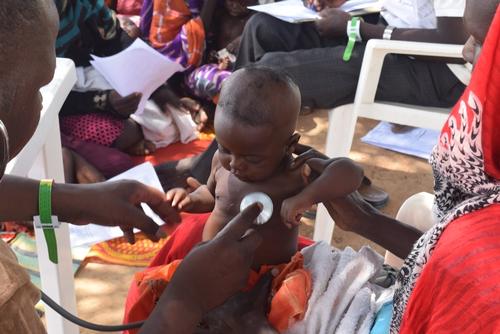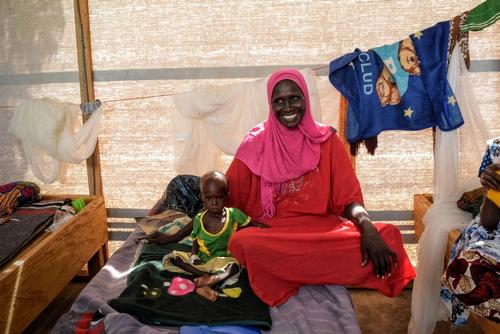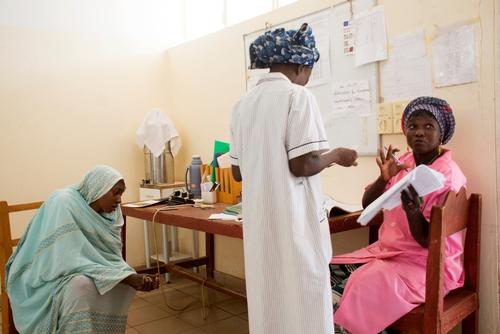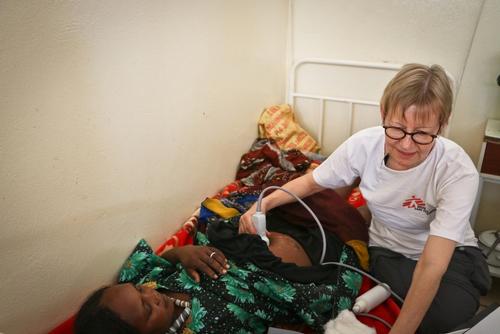“It’s serious for children here,” says Bernadette Ammaji, an MSF cook, as she prepares food for malnourished children and their mothers at MSF’s therapeutic feeding centre in Bokoro town, central Chad. “Some mums don’t have the means to be able to feed their children. Others do, but they fail to take proper care of them due to a lack of education about hygiene and nutrition. You need to be strong and brave to care for a child here. It’s not easy.”
You need to be strong and brave to care for a child here. It’s not easy.Bernadette Ammaji, MSF cook
Bernadette has worked with MSF since 2012 and is one of more than 200 staff working to tackle malnutrition in the region. Malnutrition is endemic in Bokoro, as it is across much of Chad, with almost half of child deaths in the country associated with the condition.
The Bokoro region lies around 300 kilometres east of Chad’s capital, N’djamena, towards the centre of this landlocked central African country. It’s a relatively stable part of the country, but also neglected, usually out of the headlines due to Boko Haram’s creeping presence in the northwest of Chad.
This year, in villages across the Bokoro region, MSF is running 15 mobile outpatient clinics for malnourished children between six months and five years of age in partnership with the Ministry of Health (MoH). In Bokoro town, MSF has an inpatient therapeutic feeding centre in an MoH hospital with an intensive care unit where the sickest children are referred. And for the first time, MSF is also working in the area to identify and try to prevent children at risk of malnutrition from falling ill.
An ‘extreme climate’
Bokoro’s climate is harsh. It reaches 45 degrees Celsius and has a very short rainy season. “Living conditions are really hard here,” says Suzanne Moher, an epidemiologist working with MSF in Bokoro. “Yes, it’s green now, but when I arrived here a couple of months ago there was no sign of life.” The population has just a couple of months to grow and harvest enough crops, usually millet, to last them the year. The vast majority of people in the area are subsistence farmers, so a bad harvest can be devastating.
At the moment, as the number of children with malnutrition reaches its annual peak, hundreds of women bring their babies to MSF’s mobile outpatient clinics every day. Families haven’t yet collected this year’s harvest, but last year the harvest was bad and some people have run out of food.
Last month, MSF transferred an average of 50 babies every week from the outpatient clinics to its intensive care unit in Bokoro for emergency care.
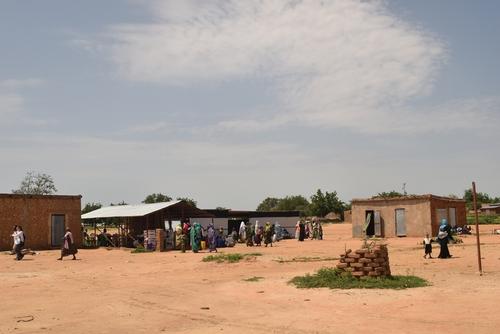
Harmful traditions
Babies and young children in Bokoro also become malnourished due to cultural practices that can unintentionally cause more harm than good.
“Some mums here say that when their next child is conceived, their breast milk is not good for their existing child,” says Benedicte La-Toumbayle, a Chadian nurse at MSF’s therapeutic feeding centre in Bokoro town. “They think that by continuing to feed their baby breast milk, they will harm the future child in their womb.”
Mothers often prefer to take their sick child to a religious leader rather than a health clinic. Marabout (Islamic religious leaders) may say Koranic prayers for the baby, give them a plant-based concoction which can be poisonous, make three cuts on a baby’s stomach or cut out their uvula, at the back of the throat. This can delay malnourished babies getting the treatment they need and, in the worst cases, vulnerable babies, whose immune systems have been weakened by a lack of food, can die from poisoning or infection. It doesn’t help that making the journey to public health clinics in Chad can be expensive. The clinics often don’t have the necessary medicines or enough trained staff, and there are often other hidden costs that make it impossible for people in this area to afford this essential care, despite a national free care policy for malnourished children.
“Sadly, a child died today,” says Benedicte. “At home, they had given him something to eat as part of a traditional medicine procedure which had poisoned him. When the child arrived here at the clinic we did everything we could. It’s miserable to see so many children suffering in front of you, but it’s also this that motivates me to keep going and to help them.”
A lack of education
Compounding these risk factors is a widespread lack of understanding across Bokoro about nutrition. “Instead of breast milk, mums sometimes feed their babies goat’s milk, bouille (a type of broth often made from millet), or other ‘adult’ food like this, and then the child gets diarrhoea and falls into malnutrition,” says Benedicte.
Education rates are low, with a national literacy rate of just 33 per cent, and most of the mothers MSF sees here haven’t spent a day at school. Many don’t understand what it is that makes their children ill. A short lesson on hygiene and nutrition is a core part of each mother’s visit to either MSF’s outpatient clinic or intensive care unit.
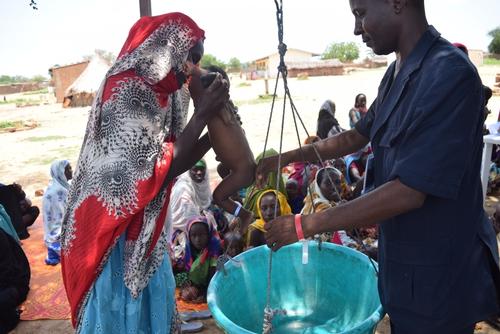
A desperate need for prevention to tackle chronic malnutrition cases
MSF has launched an emergency response to malnutrition in Bokoro at this time of year four times in the last five years. Over that time, it has become clearer that these are not one-off emergencies, but part of a pattern of recurring malnutrition with complex, interconnected causes. As a result, this year MSF started work in Bokoro before the malnutrition cases peaked at the start of the rainy season (May to October), setting up its outpatient clinics in January instead of July. Since then, MSF has treated more than 9,140 babies and children for severe malnutrition.
An MSF staff member weighs a baby as the first step in a check-up to confirm whether the baby is severely malnourished and needs to receive treatment from the MSF clinic.
This year MSF has also set up a component of the project that works to prevent babies and young children from becoming malnourished in the first place.
“The children who come to our distribution sites should be healthy, but are at risk of getting malnourished,” says Elizair Djamba, supervisor of MSF’s distribution team in Bokoro. “For the first time in Bokoro this year, we’re giving these children rations of specially formulated supplementary food and giving them a chance to stay healthy.”
The MSF teams have distributed ready-to-use supplementary food, as well as mosquito nets and soap, to more than 30,000 mothers across Bokoro, along with short health and nutrition lessons.
The work is hard, but staff feel passionately that it’s what is needed if MSF is to make an impact on recurring malnutrition. “We often arrive at the distribution site as it starts pouring with rain,” says Elizair. But we have to be out in the rain with the women, showing them that it’s important to be here, that it’s worthwhile.”



